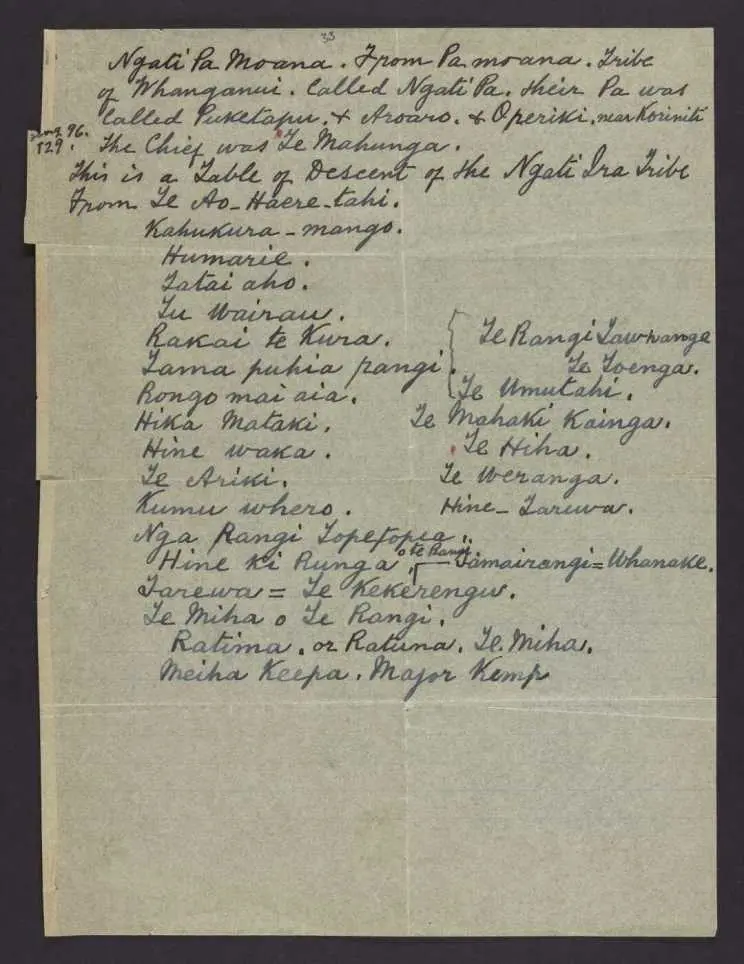Whakapapa
Nau mai, haere mai. This guide has information about whakapapa resources available online from the National Library of New Zealand and elsewhere.
He Tohutohu mō te Rangahau Whakapapa
Kia ora and welcome to this guide on whakapapa research.
This guide directs you to whakapapa resources available online from the National Library of New Zealand and elsewhere. Although many of the resources are from the Alexander Turnbull Library and National Library collections, other online resources have also been included for their whakapapa content and relevance.
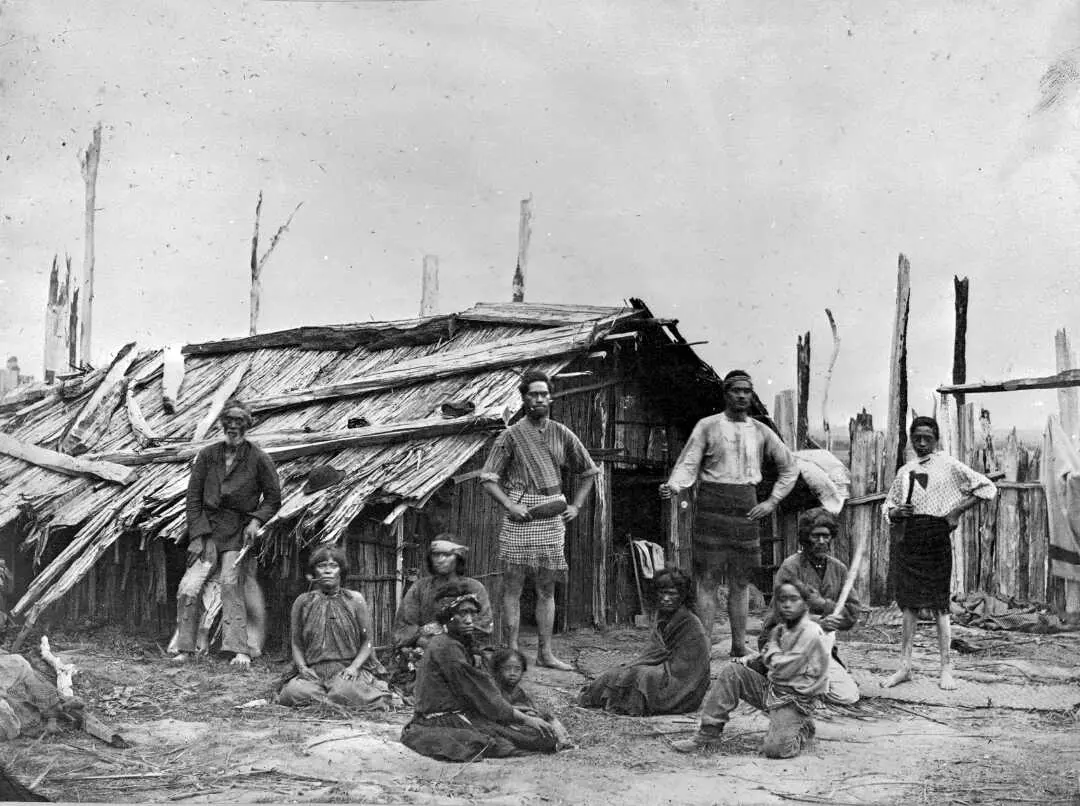
Whare puni, Te Ore Ore, Masterton, Date: (ca. 1870-1880), Ref: 1/2-083927
This introduction will take you through the basics of using the Library website to access material relevant to your whānau, hapū, and iwi, including marae information. It also provides advice on what you need to do if you are going to visit the Library in person.
Te Tīmatanga i tō rangahau whakapapa
Starting your whakapapa research
Let’s begin with looking at what information you need, so you can better identify the online resources that will help you fill your whakapapa kete (basket) of knowledge.
Names
Names are key to tracking down information such as iwi, hapū, marae, and whānau connections. Always begin with what you know about your whānau, such as the names of your parents, grandparents or other tīpuna (ancestors). If you don’t know, talk to your extended whānau and friends and find out what they know. Official documentation such as birth, death and marriage certificates, photos, family objects and heirlooms can provide useful information as well.
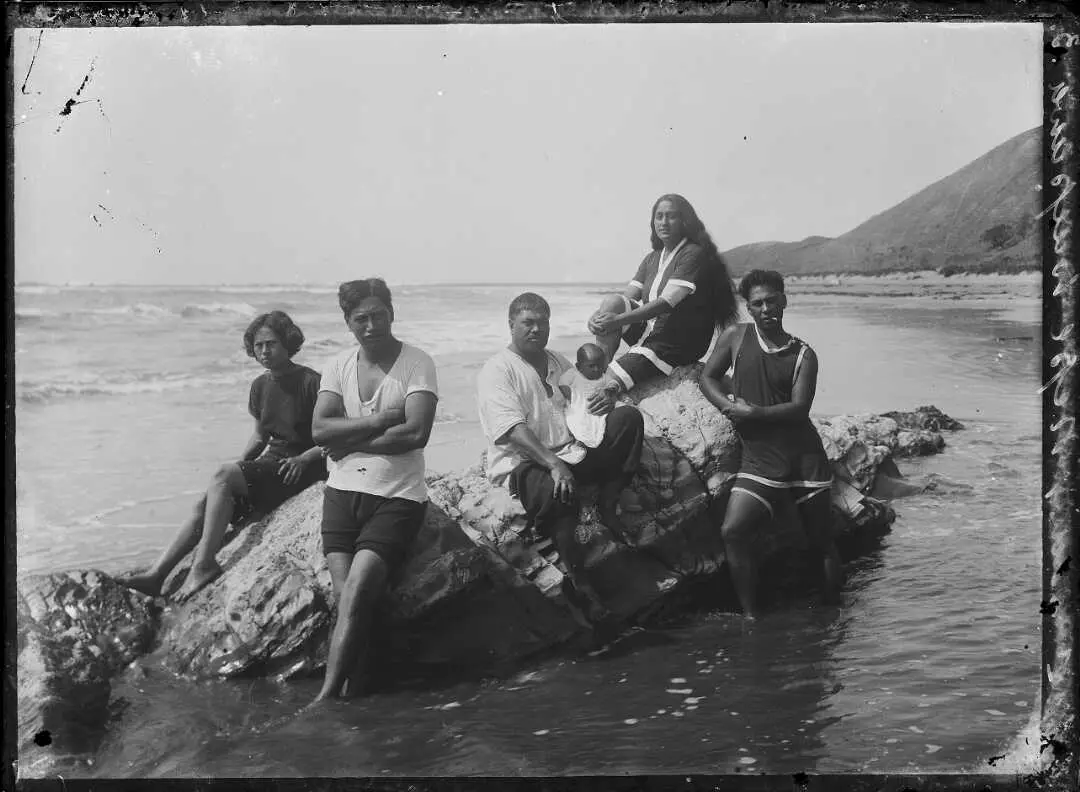
Willy Nepe and family, Date: (ca 1910s-1920s), Ref: 1/2-049687-G
Places
Place names are also useful when locating your ancestral roots. Where your parents or tīpuna were born, grew up, lived and worked can provide important clues to your whakapapa ancestry.
Dates
Dates can help with distinguishing different generations as well as unrelated families with common surnames.
Religious background
Your whānau’s religious background can also lead to sources with information about your family.
Family History Research Guide
The Library’s Family History Research Guide has a lot more useful information and advice for family history researchers, particularly when searching by names. It also contains links to a number of free family history sites.
Birth, death, and marriage records online
Births, Deaths and Marriages Online is an historical index of records for when people were born, married, and died in New Zealand for the following:
Births that occurred at least 100 years ago (including the parents’ first names)
Marriages that occurred at least 80 years ago
Deaths that occurred at least 50 years ago, or where the deceased’s date of birth was at least 80 years ago -and may include the exact birth date as supplied on the death record.
The indexes are useful for obtaining certificates from the Births, Deaths and Marriages office. These certificates give more information about the person, including names of parents or spouses, place of birth, death, or marriage, and addresses. You can also obtain printouts, which are facsimilies of the original document and may contain more information than a typed-up certificate.
Sometimes you can also find iwi and hapū information on these certificates. Although official Māori Birth and Death registrations only started in 1913, and Māori marriage registrations in 1911, many records for Māori can also be found on the general registers.
See how to search for historical birth, death, and marriage records
Papers Past
Papers Past contains more than four million pages of digitised New Zealand newspapers and periodicals. The site includes digitised New Zealand and Pacific newspapers from the 19th and 20th centuries including Niupepa Māori, digitised New Zealand journals, such as Te Ao Hou, Te Kaea and Tū Tangata, He Muka selected letters and diaries, and digitised volumes of the Appendices to the House of Representatives.
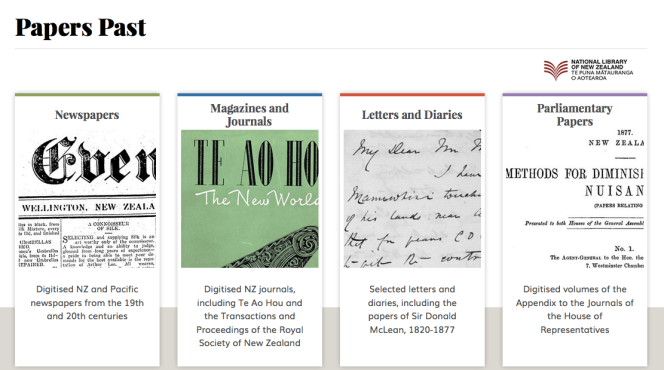
Newspapers
The information found in these newspapers that is most useful for whakapapa research include birth, death, and marriage notices, obituaries, recordings of local events, articles on community characters and land ownership and transferrals.
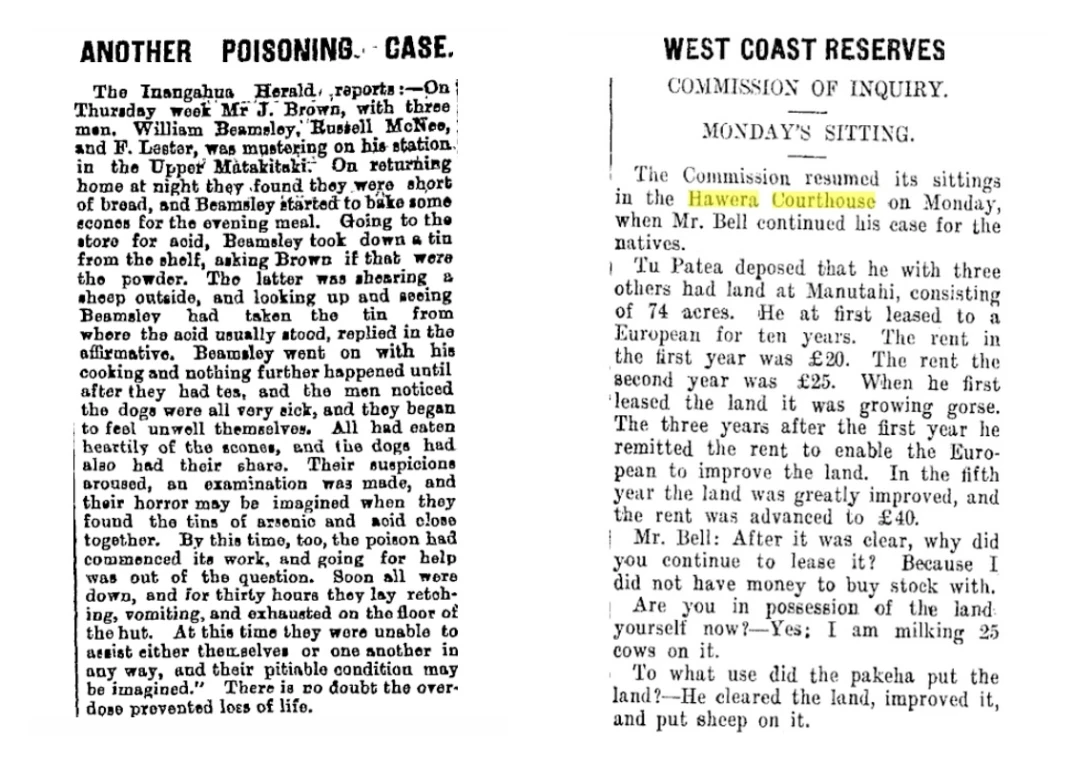
"Another poisoning case", Wanganui Herald, 4 February 1895, p4; "West Coast Reserves, Commission of Inquiry", Taranaki Daily News, Volume LIV, Issue 285, 29 May 1912, p8
Niupepa Māori
Papers Past includes several papers known as Niupepa, and these are now available through the New Zealand Digital Library. Published primarily for a Māori readership, the newspapers were predominantly in te reo Māori to cater to their target audience, although some were bilingual.
The three main types of Māori newspapers published were government sponsored, Māori initiated, and religious.
Niupepa are an important whakapapa resource as they contain information on individuals, iwi, whaikōrero and waiata, Māori opinions, as well as the development of te reo Māori as a written language.
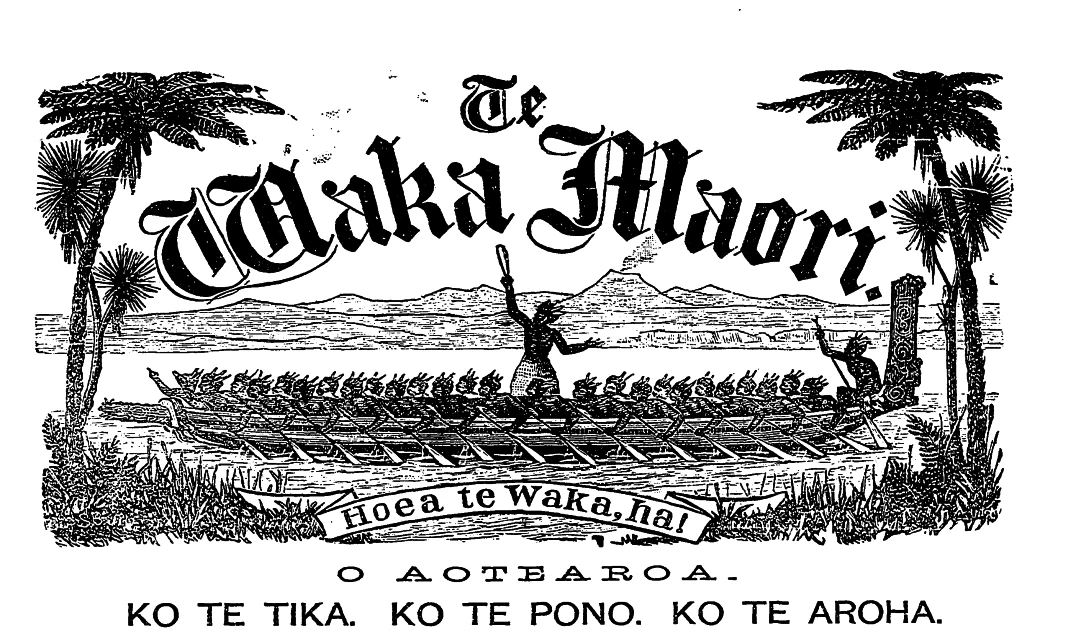
Masthead of Te Waka Māori from 1884.
The following is a listing of all 24 titles within the Niupepa Māori collection and their publishing dates that are available and text-searchable on Papers Past.
There are additional titles available on the New Zealand Digital Library website.
Niupepa | Years |
|---|---|
1848 | |
1892 | |
1861-1862 | |
1859-1862 | |
1896 | |
1862-1863 | |
1893-1895 | |
1898-1900 | |
1894-1896 | |
1857-1858 | |
1913-1921 | |
1882-1890 | |
1881 | |
1842-1863 | |
Maori Record: a journal devoted to the advancement of the Maori people | 1904-1907 |
1892-1935 | |
1863 | |
1898-1913 | |
1897-1913 | |
1883 | |
1921-1932 | |
1863-1884 | |
1874-1878 | |
1857-1858 |
The AtoJs
The Appendix to the Journals of the House of Representatives is a collection of government-related reports that cover many subjects, documenting the work of government departments and a wide range of other activities carried out by, or of interest to, the government of the day.
Published every year from 1858 to the present day, these reports contain a lot of information pertaining to Māori history, land, and whakapapa, including: Reports from native districts; Records of land purchasing; Māori Department reports, Native Trustee annual reports; Commissions of inquiry into Māori issues; Petitions to the government from Māori; Correspondence and other documents written in te reo Māori.
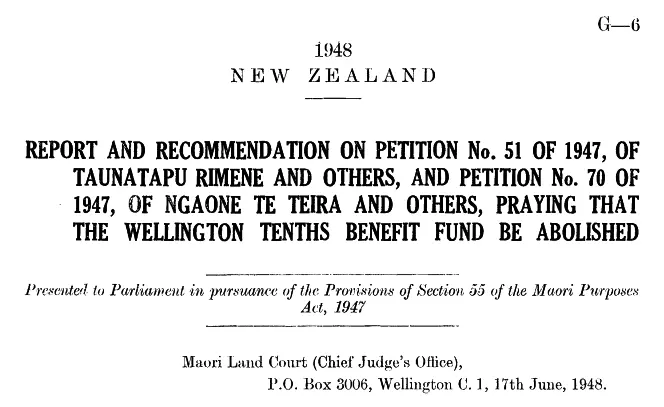
Report and recommendation on petition No. 51 of 1947, of Taunatapu Rimene and others... Appendices to the Journal of the House of Representatives, 1948, Session I.
Sir Donald McLean papers
The McLean papers are a collection of some 3000 digitised letters from the papers of Sir Donald McLean, a former Chief Native Land Purchase Commissioner and Head of the Native Affairs Department.
The papers held at the Alexander Turnbull Library, the largest surviving series of nineteenth-century Māori letters te reo Māori (with English transcriptions) in New Zealand, provide an insight into the interactions between Government and Māori at the time.
The collection can be searched by individuals’ names, iwi/hapū, or place name. Although the letters relate mainly to land purchases and sales and not whakapapa specifically, they are an excellent resource for te reo Māori students as well as those interested in broader social issues for Māori.
The McLean papers on Papers Past
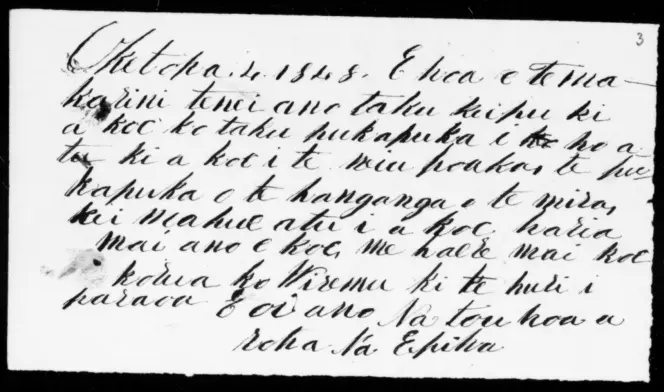
Letter by Epiha Te Kuao to Sir Donald McLean, related to Epiha Arama Karaka, 4 October 1848.
Te Ao Hou
Te Ao Hou was written in both English and te reo Māori and published four times a year between 1952 and 1975 by the Māori Affairs Department. The content focusses on matters of interest to Māori including the social and political environment, people and places, history and events, the arts including waiata, poems, legends and literature, and obituaries (mamai aroha).
You can also browse Te Ao Hou on its own website, which shows you all the issues at once, including their covers, dates, and issue numbers. Open an issue to browse its contents.
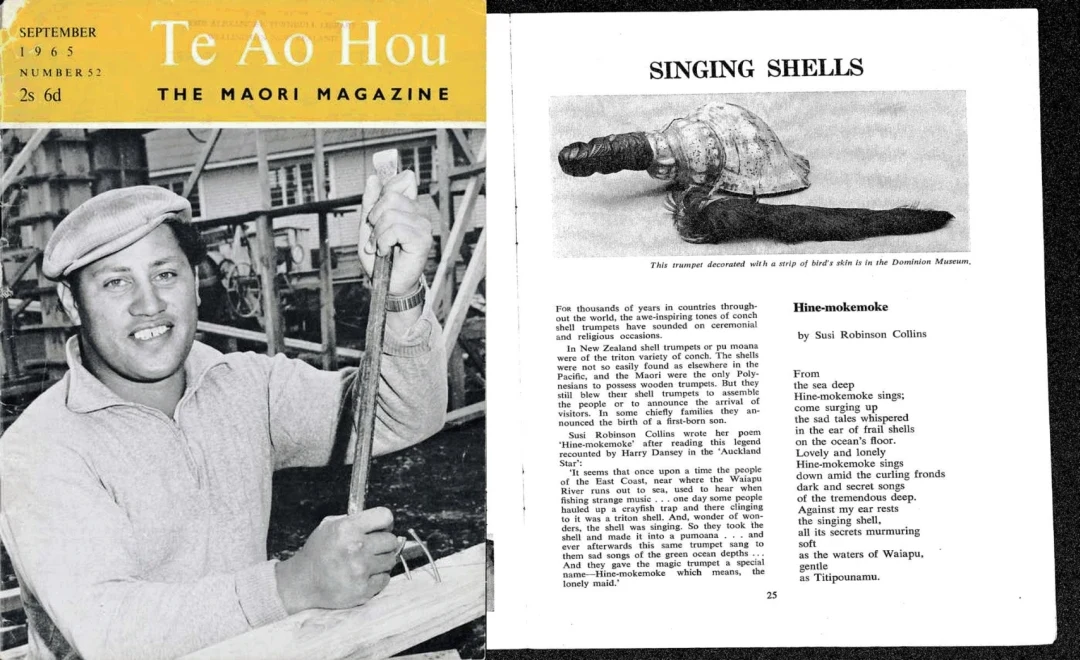
Cover of Te Ao Hou, and "Singing Shells" (p25), September 1965.
Tū Tangata
The first issue of Tū Tangata published in August/September 1981 was a joint publication by the Department of Māori Affairs, the New Zealand Māori Council and the Māori Women’s Welfare League and was formed from the merging of two earlier titles, the Department’s Te Kaea and the Council’s Te Māori.
Put out bi-monthly until its final issue in June/July 1987, Tu Tangata provides an insight into both historic and contemporary Māori life. Like its predecessors, the magazine covers a wide range of topics including sports, political news, health, national and local events, as well as individuals’ achievements. It also features creative writing and artwork by Māori artists.
Primarily written in English, there is the occasional article, letter to the editor or poroporoakī (eulogy) in te reo Māori.
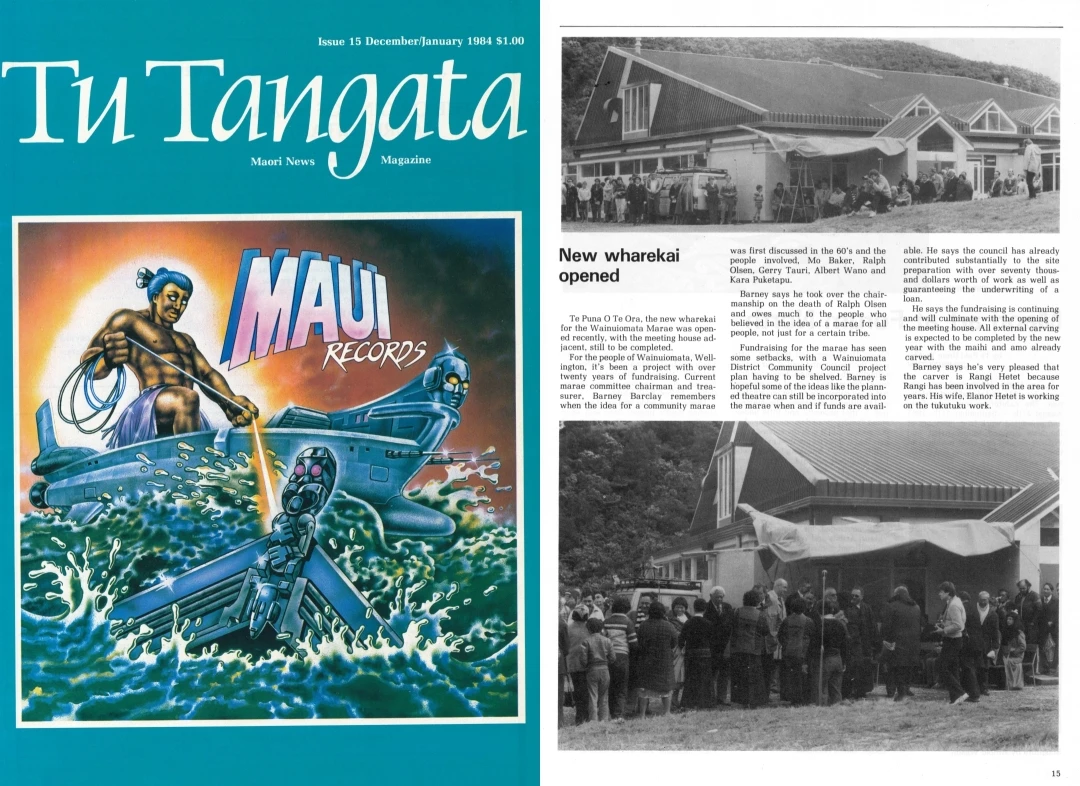
Cover of Tū Tangata, and "New wharekai opened" (p15), Issue 15 Dec/Jan 1984.
Royal Society papers
Covering 1868 to 1961, the Transactions contain many articles and illustrations by people like Elsdon Best, S. Percy Smith and Thomas W. Downes on the beliefs, customs and practices of Māori people.
Many of the writings are based on interviews with Māori elders of various tribes, and include waiata, whakatauaki, karakia, and traditions and practices particular to specific iwi and hapū groups.
There is a very useful author and subject index for the period 1869-1961.
Transactions and Proceedings of the Royal Society of New Zealand on Papers Past
Alexander Turnbull Library Catalogue (Tiaki)
Tiaki is the Alexander Turnbull Library’s catalogue of unpublished material. It provides access to descriptions of the many Māori letters, diaries, journals, maps, oral histories, ephemeral, and pictorial collections held in the Library.
Although there is some material that is digitised and available to view online, the majority of these collections are not digitised and you need to visit the National Library in Wellington in person to view these items.
You can search by name, iwi/hapū, place, or language, including Māori, to find out what material is held, what type of collection it is and a bit of detail about the content. If you hover over the symbols that sit above the search box on the left hand side of the screen you will get the options of place, personal name, iwi/hapū and format as well.
Note that some material is restricted based on donor agreements, and you will need permission to view or copy it. In these cases, we’ll help you through the process, so contact us through the Ask a librarian form, or by phoning 0800 474 300.
If you want to publish, get in touch with us to arrange permissions and work through any possible copyright issues.
Alexander Turnbull Library Catalogue (Tiaki)
Journal of the Polynesian Society
The Journal of the Polynesian Society, published from 1892 to the present day, contains tribal, whānau, and tĪpuna information, including actual whakapapa tables and charts for different iwi and rohe.
There are indexes for these up to 1991.
Journal of the Polynesian Society
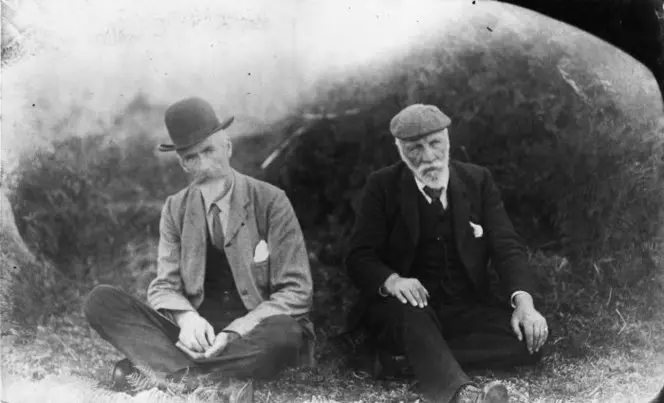
Elsdon Best and Percy Smith, 1908. Ref: 1/2-028237-F.
Index of Māori names
H. J. Fletcher's Māori Names Index is from an unpublished manuscript compiled about 1925 by the missionary Rev. Henry James Fletcher (1868-1933).
The index is useful for whakapapa research as it contains a long alphabetical list of Māori names referred to in books and journals, including the names of boundaries, Māori individuals, canoes, trees, landmarks, and geographical locations.
The Journal of the Polynesian Society and Transactions and proceedings of the Royal Society of New Zealand as well as the 5 volumes of The Ancient History of the Māori by John White are all heavily referenced by Fletcher in the Index.
It is also available in paper format and microfiche.
Māori Maps
The Māori Maps website is a portal to information on some 800 marae across Aotearoa.
It provides a nationwide map of all the marae as well as photos of each marae, contact and background information, and whakapapa information such as waka, iwi, hapū, and rohe. This also includes the names of the wharenui and wharekai.
Map location and directions right to the gateway of each marae are also provided, so it is definitely a must for whakapapa researchers.
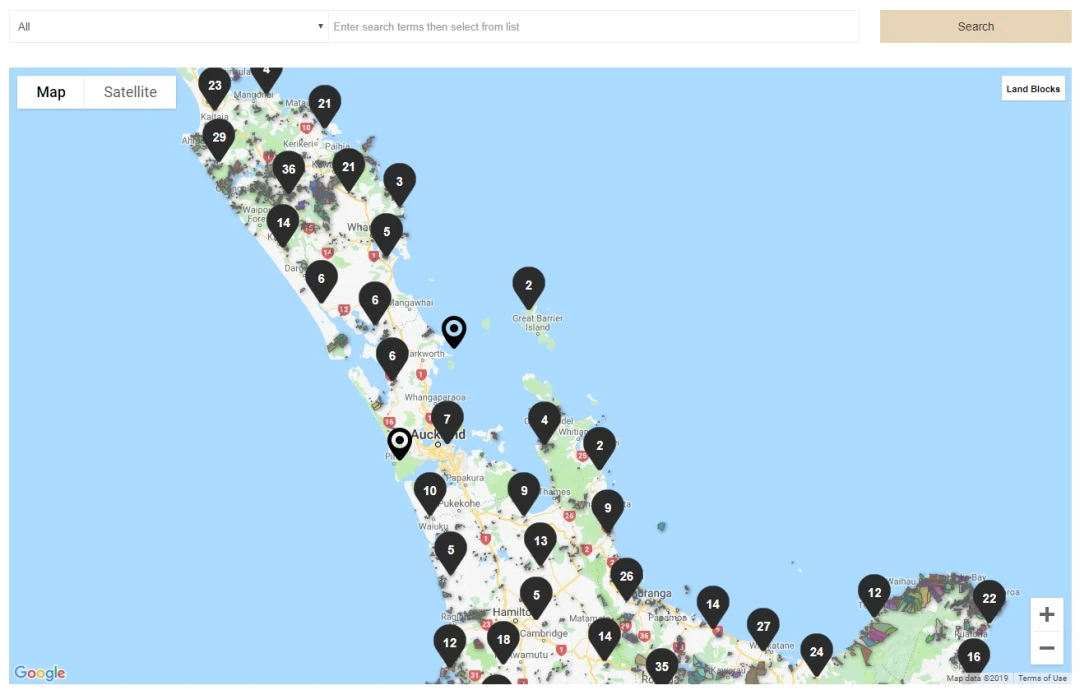
Te Kāhui Māngai (Directory of Iwi and Māori organisations)
Te Puni Kōkiri’s database, Te Kāhui Māngai, provides information on iwi identified in the Māori Fisheries Act 2004, and those iwi/hapū that have begun the process of negotiating settlement of their historical Treaty of Waitangi claims.
It contains addresses and contact information for hapū, marae and iwi including iwi/hapu mandated representatives as well as National and Urban Māori organisations as well as maps that illustrate different types of information according to need. A good resource that is easy to navigate and user-friendly.
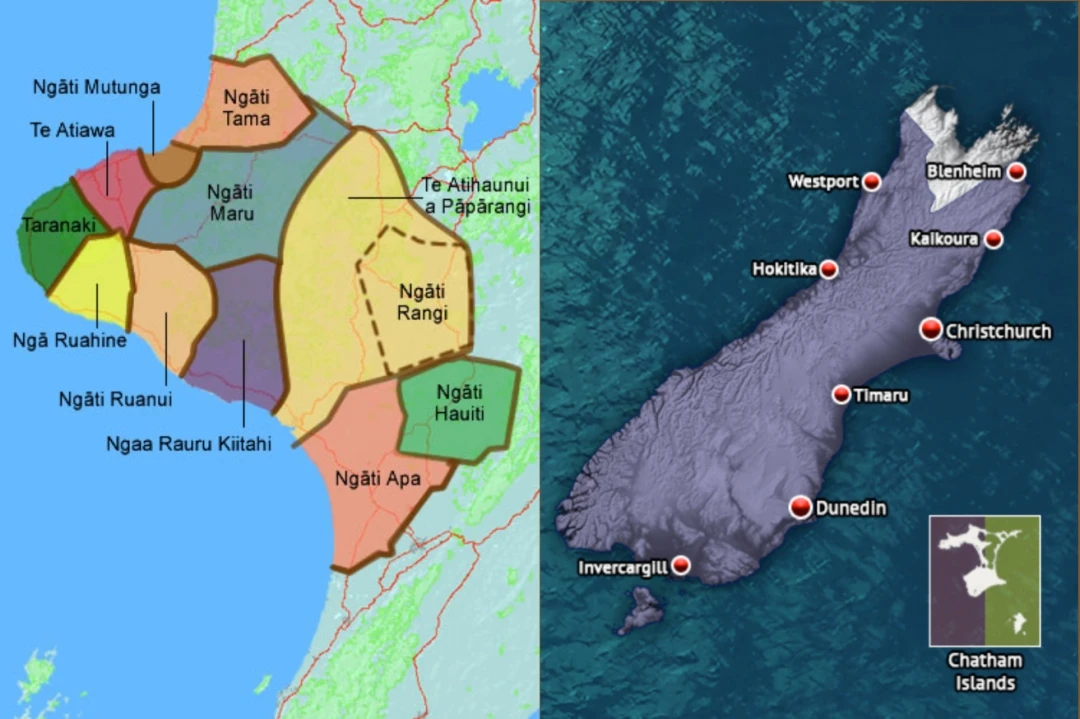
Māori Land Court Minute Books Index
This index contains entries to over 1,100 minute books between 1865 and 1910, from the Taitokerau, Waikato-Maniapoto, Tairawhiti, Waiariki, Aotea, Takitimu, and Waipounamu Maori Land Court Districts.
A really good introduction and guide to searching the index can be found on the Auckland University Library’s website.
Māori Land Court Minute Books Index
New Zealand Electronic Text Centre
The New Zealand Electronic Text Collection contains significant digitised New Zealand and Pacific Island texts and materials held by the Victoria University of Wellington library.
Most of the texts referred to in Fletcher’s Index of Māori Names, including Elsdon Best’s The Ancient history of the Māori, R. K. Dell’s Pa Māori, and Rev R. T. Taylor’s Te Ika a Maui, or New Zealand and its inhabitants are searchable and available in full text on this database.
A Digitised Māori Language Resource
He Muka is a publication in te reo Māori published by Te Taura Whiri i Te Reo Māori– The Māori Language Commission. First published in June 1988 as a quarterly print-based publication, its original purpose was to promote te reo Māori as a living language; to publish kupu hou and to promote the work of Te Taura Whiri i Te Reo Māori.
In December 2017 a digital version of He Muka was launched on the Commission's website, the main objective being to provide a publication written entirely in Māori language of the highest quality, specifically targeted at fluent speakers.
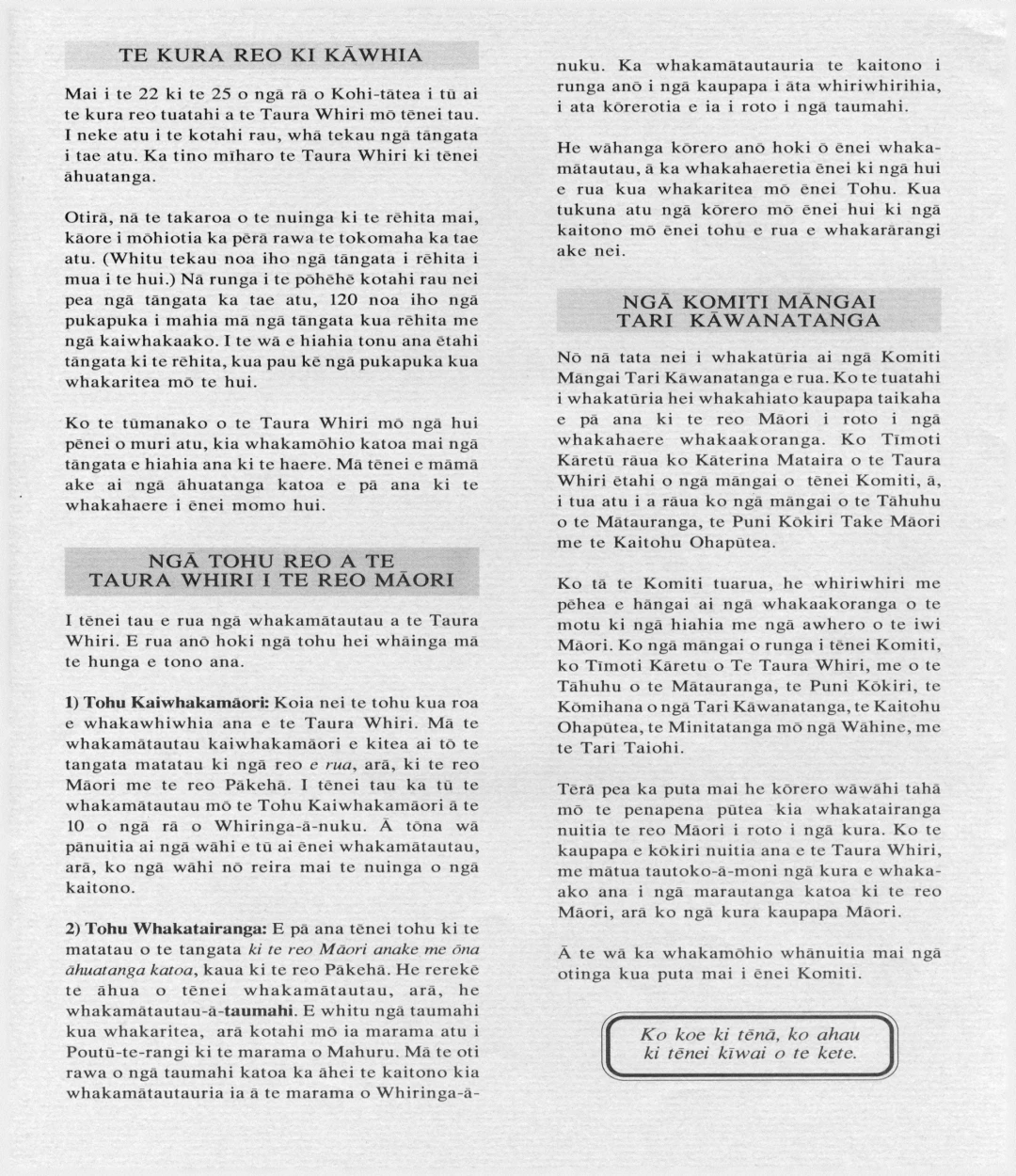
Tō haerenga mai | Visiting the Library
If you want to visit the Library in person, get in touch with us beforehand so we can help you prepare for your visit. We can assist with pre-registration, checking the availability of collection items, helping you with permissions, and referring you on to other organisations that may be able to help you while you are in Wellington.
Freephone: 0800 474 300
Enquire online — Ask a librarian
Prepare for your visit
Other useful pages that you can consult before you visit
Māori Reference Collection
Family History Collection
Visiting the Reading Rooms
The Collections
